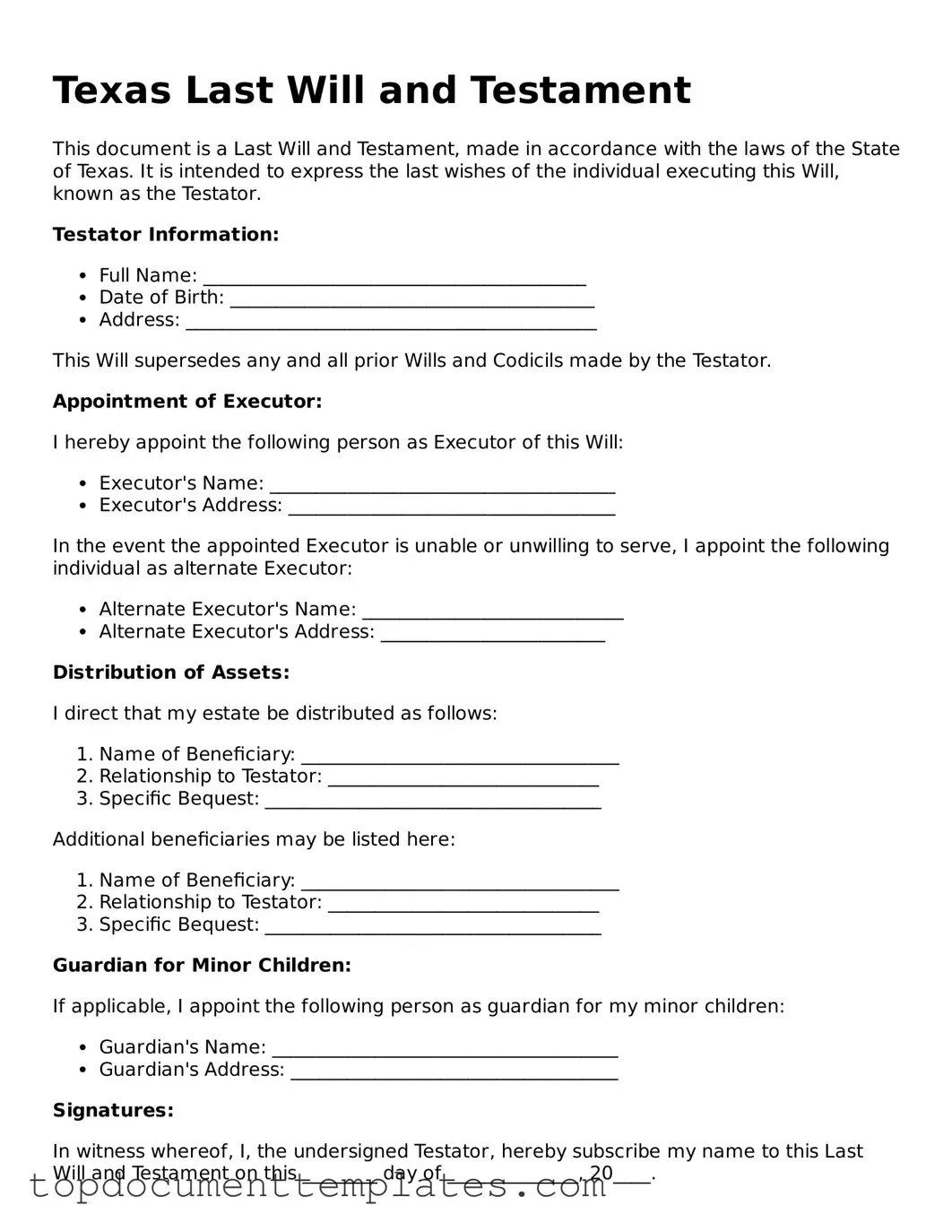Valid Last Will and Testament Form for Texas State
Creating a Last Will and Testament is a critical step in ensuring that your wishes are honored after your passing. In Texas, this legal document serves as a formal declaration of how your assets should be distributed, who will take care of your minor children, and any specific wishes you may have regarding your funeral arrangements. The Texas Last Will and Testament form includes essential components such as the identification of the testator, the appointment of an executor, and the designation of beneficiaries. It also allows you to specify any particular bequests, ensuring that treasured possessions are passed on to loved ones. Understanding the importance of this form is crucial; it not only provides peace of mind but also helps to prevent potential disputes among family members. As you navigate the process of creating your will, it's vital to consider all aspects thoroughly to ensure that your intentions are clearly communicated and legally binding.
Similar forms
- Living Will: A living will outlines your wishes regarding medical treatment in case you become incapacitated. It specifies what life-sustaining measures you want or do not want.
- Durable Power of Attorney: This document allows you to appoint someone to make financial or legal decisions on your behalf if you are unable to do so. It remains effective even if you become incapacitated.
- Healthcare Proxy: A healthcare proxy designates someone to make medical decisions for you when you cannot. It ensures your healthcare preferences are honored.
- Trust Agreement: A trust agreement establishes a legal entity that holds assets for the benefit of beneficiaries. It can help manage your estate and avoid probate.
- Codicil: A codicil is an amendment to an existing will. It allows you to make changes without creating an entirely new document.
- Living Trust: A living trust is created during your lifetime and can manage your assets. It helps avoid probate and provides a way to distribute your estate according to your wishes.
- Advance Directive: An advance directive combines a living will and healthcare proxy. It provides instructions for medical care and designates a decision-maker.
- Letter of Instruction: This informal document provides guidance to your loved ones about your wishes, including funeral arrangements and asset distribution. It complements a will but is not legally binding.
- Beneficiary Designation: This document specifies who will receive certain assets upon your death, such as life insurance policies or retirement accounts. It overrides instructions in a will.
Guidelines on Writing Texas Last Will and Testament
Once you have the Texas Last Will and Testament form ready, it’s important to fill it out accurately to ensure your wishes are clearly communicated. Follow these steps carefully to complete the form.
- Begin by entering your full name at the top of the form.
- Provide your current address, including city, state, and zip code.
- State your marital status. Indicate whether you are single, married, or divorced.
- List your children’s names and ages. If you have no children, state that clearly.
- Designate an executor. This person will carry out your wishes as outlined in the will. Include their full name and contact information.
- Identify your beneficiaries. These are the individuals or organizations who will receive your assets. Clearly state their names and the specific assets they will inherit.
- Specify any guardianship arrangements for minor children, if applicable. Include the name of the proposed guardian.
- Review the entire form for accuracy. Make sure all names and details are correct.
- Sign and date the form in the presence of two witnesses. They must also sign the document.
- Store the completed will in a safe place, and inform your executor of its location.
File Information
| Fact Name | Description |
|---|---|
| Governing Law | The Texas Last Will and Testament is governed by the Texas Estates Code, specifically Title 2, Chapter 251. |
| Requirements | For a will to be valid in Texas, it must be in writing, signed by the testator, and either witnessed by two witnesses or notarized. |
| Age Requirement | In Texas, individuals must be at least 18 years old to create a valid Last Will and Testament. |
| Revocation | A Texas will can be revoked by creating a new will, by physically destroying the original, or through a written declaration. |
Other Popular Last Will and Testament State Forms
Last Will and Testament Template Georgia - A necessary document that evolves with changes in life circumstances or laws.
Making a Will in Iowa - Helps to ensure a legacy that aligns with your ideals and values regarding wealth distribution.
How to Make a Will in Florida - Provides a space for you to leave personal messages or special instructions for loved ones.
Can I Write My Own Will in Nj - Helps minimize disputes among family members regarding asset distribution.
